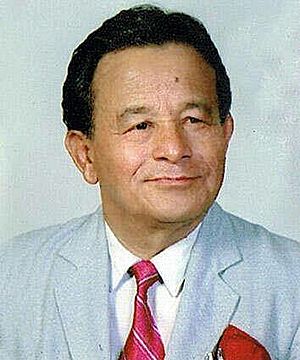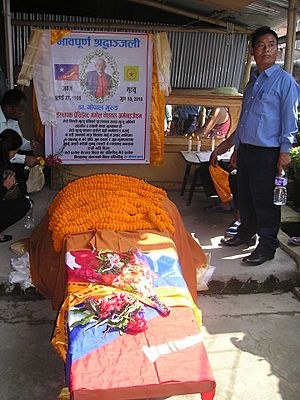Gopal Gurung
Quick facts for kids
Gopal Gurung
|
|
|---|---|
 |
|
| Founder President of the Mongol National Organisation | |
| In office 1989–2016 |
|
| Succeeded by | Budda Lal Meche |
| Personal details | |
| Born | 7 December 1939 Darjeeling |
| Died | 10 June 2016 Alka Hospital, Lalitpur, Nepal |
| Education | M.A. Political science PhD |
| Alma mater | Ambedkar University Delhi |
| Signature |  |
Gopal Gurung (Nepali: गोपाल गुरुङ) (born December 7, 1939 – died June 10, 2016) was an important person from Nepal. He was a politician, writer, journalist, and teacher. He strongly believed in protecting the human rights of the native people of Nepal.
Gurung was the main editor for weekly newspapers like New Light and Thunderbolt. He also helped lead the World Nepalese Association. He worked as an advisor for the Press Foundation of Asia in the Philippines.
He was one of the first writers to talk about unfair treatment based on a person's background. He wrote about this in 1972 in the Nepali newspaper New Light. Later, he wrote a very important book called Hidden Facts in Nepalese Politics.
Gurung started the Mongol National Organisation. He wanted Nepal to be a republic, where people elect their leaders. Even when the government had strict control (during the Panchayat era), Gurung wanted Nepal to be a federal republic. This means power would be shared across different regions. The government put Gurung in jail because of his book Hidden Facts in Nepalese Politics.
His book was banned in Nepal, but it became very popular in Sikkim and Darjeeling. Gurung was arrested on August 30, 1988. He was accused of trying to cause division. He was sent to Bhadragol central jail for three years without a proper trial.
While in jail, on January 1, 1989, he started his political organization, the Mongol National Organisation. It had its own flag and plans. When the strict Panchayat system ended, and a system with many political parties began, Gurung and other political prisoners were set free on April 13, 1990.
Contents
Early Life and Education
Gopal Gurung was born on December 7, 1939, in Mahanadi, Darjeeling. His parents were Tej Bahadur Gurung and Kumari Gurung. His father was involved in politics, which made Gurung interested in it too. His experiences as a teacher, writer, and journalist also shaped his ideas.
His father, Tej Bahadur Gurung, joined politics after leaving the British Army. Many former soldiers did the same. Gurung came to Nepal in 1952. He started teaching in Ilam district when he was 17. There were not many schools back then. He even started a small elementary school in an old goat pen.
Later, he worked as an assistant headmaster and headmaster in schools in Jhapa district. In 1964, he taught for a year at a British army camp in Dharan. In 1967, he began publishing and editing a Nepali newspaper called New Light from Kathmandu.
His Studies
Gurung finished his primary education in Darjeeling and high school in Pushparani Roy Mem H S School. After the Second World War, his father left the military and became involved in politics. His father faced problems and was accused of being a communist. After that, his father went to Nepal to help overthrow the Rana regime.
Gurung had heard that his grandfather lived in Ranitar in Panchthar district of eastern Nepal. He dreamed of visiting his homeland. So, Gurung came to Nepal in 1952 to fulfill this dream. He went to Ilam, in eastern Nepal, to help spread education. He started teaching in Kolbung by setting up a school.
Gurung traveled to many remote areas. He worked as a teacher for some time in places like Jhapa's Gauriganj, Dharan Depot, Kathmandu, and West Parbat Rakhu. He finished high school in 1959 and learned Bengali. He became fluent in Nepali, Hindi, English, and Bengali. He also received military training.
Gurung faced challenges in his education. He worked hard and completed his B.A. from Saraswati Multiple Campus at Tribhuvan University in 1967. He then earned his master's degree in Political Science from Tribhuvan University through private study.
Arrest and Support
Gurung was a strong supporter of human rights for the native people of Nepal. He wrote many books. The Hidden Facts of Nepalese Politics was his most famous and talked-about book. The Panchayat government arrested and jailed him in 1989 without a trial. They felt threatened by what he wrote.
The powerful people in the Hindu-dominated government tried to stop Gurung from speaking out. He spoke against unfair treatment, corruption, and exploitation of native people, who are mostly Buddhist. But it was too late; his ideas had already spread. News of his arrest went beyond Nepal, leading to protests and demands for his release.
International Support
When Gurung became sick in prison, the government was slow to take him to the hospital. While he was in jail, he received a lot of support from journalists, writers, and others from Nepal and around the world. Organizations like PEN and Amnesty International (from London and Denmark), the Press Foundation of Asia (Philippines), and the All India Journalist Council wrote to the government. They asked for his early release and supported his human rights.
Many letters came in from supporters in Nepal, India, Indonesia, Norway, France, and Denmark. People of Buddhist and Christian faiths prayed for his health and release. Mochtar Lubis wrote strong letters to the Prime Minister and demanded Gurung's release. A photo of Gurung was published in Denmark's Human Rights Bulletin AKTION. Teachers in some Danish schools even taught their students about Gurung. While he was in prison, students, mayors, and people from different jobs wrote him letters of support.
A weekly newspaper from Sikkim published a photo of Gurung with Nelson Mandela, a famous South African politician, and Taslima Nasreen, a Bangladeshi writer. A German writer also wrote about him in German. At that time, three important writers in the world were facing risks. Gurung was released when the multi-party system began. These examples show how people around the world supported Gurung's fight for human rights, democracy, and freedom. They understood that his struggle was not about division but about a good cause.
In Hiding After Second Book
Gurung had to go into hiding for five years. This happened after his book In Quest of Mongol Entity and Doctorate (PhD) on MNO was published in 2001. This book spoke out against the monarchy (rule by a king) and the idea of Nepal being a Hindu nation. Because of this book, Gurung's own sister, Krishna Gurung, was held for a month and treated badly.
Mongol National Organisation
Gurung started the Mongol National Organisation (MNO) while he was in Bhadragol Jail. The MNO was created on January 1, 1989. However, the Election Commission did not officially register it in 1990. After the commission refused, Gurung fought the case for six years in court. He even argued his own case. The Supreme Court eventually dismissed the case. The MNO was not registered for 18 years.
Even though the MNO had some success in local elections in 1992 and 1997, it did not win in the parliamentary elections of 1991, 1994, and 1999. Gurung believed he was unfairly targeted to lose these elections. He continued his work despite the risks.
Nepal was later declared a federal democratic republic and a secular country. In 2008, after 18 years, the Mongol National Organization was finally registered. In the first election for the Constituent Assembly, they received 11,578 votes. In the second Constituent Assembly election in 2014, they received 8,215 votes.
Political Change in Sikkim
Gurung seemed to play a role in the political changes in Sikkim after 1992. Later, Pawan Kumar Chamling became the leader in Sikkim. The previous leader, Bhandary, said that Chamling was just a temporary leader controlled by Gopal Gurung.
However, Pawan Chamling publicly stated on September 19, 1992, that when he was removed from his party, Bhandary accused him of being connected to the MNO. This organization was led by Gopal Gurung from Kathmandu. Chamling held up Gurung's book Hidden Facts in Nepalese Politics. He told the public that Bhandari accused him of using it as a guide to create a larger Mongolian kingdom.
Later in his life, Gurung often said that the way Pawan Chamling treated him, after he helped him, was a big lesson. For some years, politics in Sikkim was discussed in Gurung's name. Gurung had helped Pawan Kumar Chamling, who was the Chief Minister of Sikkim for a long time. The time of Chamling's leadership has now ended.
Gurung's Ideas and Beliefs
Gurung believed that the history of Nepal was not always told truthfully. Some of the ideas he brought up during the Panchayat period have been accepted. Gurung fought his whole life for Nepal to be a federal democratic republic and a secular state. A secular state means it is not based on one religion. He argued that a state should not be formed based on ethnic groups. He thought the country should be organized based on its geography, like rivers, hills, and mountains.
Many leaders supported other ideas from Gurung. He wanted the national flag of Nepal and the national animal, the musk deer, to be kept. He also suggested that statues of kings and queens should be moved to a museum. He had different views on some traditional celebrations. Gurung also disagreed with the term "Adibasi Janajati" (indigenous nationalities). He believed the term "Mulbasi Mongols" (native Mongols) should be used instead. His followers continue to raise this point.
Awards
In 1986, Gurung won the Mitsubishi Award from Japan.
Death
Gopal Gurung passed away on June 10, 2016. He was being treated for sudden blood cancer at Alka hospital. Gurung had lived his life as a secularist, meaning he did not follow specific religious rituals. Because of this, he was buried without any religious ceremonies. His funeral was held at the Mongol Research Center building in Bahundangi, Jhapa. Thousands of supporters were present. Gurung had wished to be buried in this way, without any traditional rituals.


